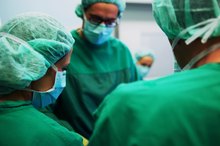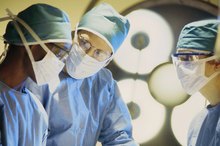What does fact checked mean?
At Healthfully, we strive to deliver objective content that is accurate and up-to-date. Our team periodically reviews articles in order to ensure content quality. The sources cited below consist of evidence from peer-reviewed journals, prominent medical organizations, academic associations, and government data.
- National Institutes of Health: Vaginal Birth After Cesarean: New Insights
- MayoClinic.com: Labor and Delivery, Postpartum Care
- MayoClinic.com: Antibiotic-Associated Diarrhea
The information contained on this site is for informational purposes only, and should not be used as a substitute for the advice of a professional health care provider. Please check with the appropriate physician regarding health questions and concerns. Although we strive to deliver accurate and up-to-date information, no guarantee to that effect is made.
Diarrhea After a C-Section
Childbirth, whether through a Cesarean section or vaginally, is closely associated with incontinence, both urinary and fecal. Diarrhea is slightly less common among women who have a C-section, but it occurs for a variety of reasons. According to research reported in the "Obstetrics & Gynecology" journal, 38 percent of women in a large study reported the onset of diarrhea problems following a C-section. It’s an embarrassing condition, but you should never hesitate to mention it to your obstetrician, because in many cases treatment is easy and highly effective.
If you are experiencing serious medical symptoms, seek emergency treatment immediately.
Diarrhea and Fecal Incontinence
Diarrhea is when you have frequent, loose bowel movements, but a closely related condition common after pregnancy is incontinence of the bowels. Fecal or anal incontinence is when you leak stools or gas or when you have frequent urgency to do so, even if there is no actual leakage, because the muscles in the anus and rectum can’t control the passage of stools. Diarrhea can cause fecal incontinence.
- Diarrhea is when you have frequent, loose bowel movements, but a closely related condition common after pregnancy is incontinence of the bowels.
Pregnancy Issues
What Causes Loss of Bladder Control When Coughing?
Learn More
The National Institutes of Health reports that a lot of women request C-section delivery because they believe they will avoid incontinence issues, but the agency says there’s no conclusive proof that Cesareans provide this protection. Rather, the diarrhea or incontinence women experience can be related to a number of factors, such as how long they pushed while in labor and how long their labor progressed before they had a C-section, as well as other factors generally associated with pregnancy. Pregnancy places a great deal of pressure on the pelvic floor, and some women experience organ prolapse -- the failure of muscles to keep an organ in its normal place -- and stress incontinence as a result.
Diarrhea after Giving Birth
In “Cesarean Delivery on Maternal Request,” the federal Agency for Healthcare Research and Quality reported research on a small sample of women in which close to 4 percent of women who planned their electiveCc-section and had no labor went on to experience diarrhea. Nearly 6 percent of women who had emergency C-sections, after some trial of labor, developed anal incontinence. In the “Listening to Mothers” survey conducted by Childbirth Connections, more women with C-sections reported bowel problems than women who delivered vaginally. According to the "International Urogynecology Journal" and "Pelvic Floor Dysfunction" journal, being overweight, pushing for at least two hours and having been previously constipated are risk factors for postpartum fecal incontinence no matter how a woman delivers.
- In “Cesarean Delivery on Maternal Request,” the federal Agency for Healthcare Research and Quality reported research on a small sample of women in which close to 4 percent of women who planned their electiveCc-section and had no labor went on to experience diarrhea.
Antibiotics
Symptoms Following Ileostomy Reversal
Learn More
Another reason women experience diarrhea following a C-section is due to the antibiotics they are given before and after the surgery. Prior to a C-section, expectant mothers are given antibiotics to reduce the risk of infection. Nearly all antibiotics can cause diarrhea 3. This is because they disrupt the balance between the good, or beneficial, bacteria and harmful bacteria. By destroying both kinds of bacteria while trying to fight infections, antibiotics can allow the bacteria that are resistant to the antibiotic to grow out of control. They produce toxins that damage the walls of the bowel and cause inflammation. In addition, it is possible to receive additional antibiotics after your C-section if you suffered a bowel injury 5. Although rare, perforations and burns from surgical instruments can happen. Treatment requires additional antibiotics, which increases your risk of diarrhea.
- Another reason women experience diarrhea following a C-section is due to the antibiotics they are given before and after the surgery.
Treatment of Diarrhea
If you have persistent trouble controlling your bowel movements, contact your health care provider. You should be examined to rule out any illness that might be causing the diarrhea. Once you’re cleared of a more serious condition, several options exist to control the problem, reduce the frequency of stools and improve their consistency. Your doctor can prescribe a bulk-forming laxative, and you can take fiber supplements daily. In addition, loperamide hydrochloride, found in the over-the-counter medicines like Imodium, can increase the transit time of bowels. This allows stools to absorb more water and become firmer. Your doctor can also put you through rectal sensitivity and anal sphincter strength training.
- If you have persistent trouble controlling your bowel movements, contact your health care provider.
- Once you’re cleared of a more serious condition, several options exist to control the problem, reduce the frequency of stools and improve their consistency.
Related Articles
References
- National Institutes of Health: Vaginal Birth After Cesarean: New Insights
- MayoClinic.com: Labor and Delivery, Postpartum Care
- MayoClinic.com: Antibiotic-Associated Diarrhea
- Wall Street Journal: New Thinking on C-section Antibiotics
- EMedTV: Bowel Injury After C-Section
- Whitehead WE, Borrud L, Goode PS, et al. Fecal incontinence in US adults: epidemiology and risk factors. Gastroenterology. 2009;137(2):512–517.e5172. doi:10.1053/j.gastro.2009.04.054
- National Institute of Diabetes and Digestive and Kidney Diseases. Symptoms and causes of fecal incontinence. Updated July 2017.
- Richards RJ. Management of abdominal and pelvic abscess in Crohn's disease. World J Gastrointest Endosc. 2011;3(11):209-12. doi:10.4253/wjge.v3.i11.209
- University of Michigan Medicine. Accidental bowel leakage (fecal incontinence). Updated March 2017.
- Li YD, Xu JH, Lin JJ, Zhu WF. Excisional hemorrhoidal surgery and its effect on anal continence. World J Gastroenterol. 2012;18(30):4059-63. doi:10.3748/wjg.v18.i30.4059
- Clinical Advisor. Dextranomer gel injections for fecal incontinence. Updated August 27, 2011.
- Rao SS, Benninga MA, Bharucha AE, Chiarioni G, Di lorenzo C, Whitehead WE. ANMS-ESNM position paper and consensus guidelines on biofeedback therapy for anorectal disorders. Neurogastroenterol Motil. 2015;27(5):594-609. doi:10.1111/nmo.12520
- Khera AJ, Chase JW, Salzberg M, Thompson AJV, Kamm MA. Gut-directed pelvic floor behavioral treatment for fecal incontinence and constipation in patients with inflammatory bowel disease. Inflamm Bowel Dis. 2019;25(3):620–626. doi:10.1093/ibd/izy344
- Pescatori LC, Pescatori M. Sphincteroplasty for anal incontinence. Gastroenterol Rep (Oxf). 2014;2(2):92-7. doi:10.1093/gastro/gou003
- The Simon Foundation for Continence. Artificial sphincter surgery for bowel incontinence.
- Crohn's and Colitis Foundation. Surgery for Crohn's disease.
- Ansari P. "Anorectal Abscess." The Merck Manual Home Health Handbook. May 2012.
- US. National Institutes of Health. Department of Health and Human Services. "Fecal Incontinence." National Digestive Diseases Information Clearinghouse. 20 Apr 2012.
- American Society of Colon & Rectal Surgeons. "Bowel Incontinence." FACRS.org. 2012.
- Life And IBD. "Urgency and Incontinence." European Federation of Crohn's and Ulcerative Colitis Associations (EFCCA). 2013.
- Palsson OS, Heyman S, Whitehead WE. "Biofeedback treatment for functional anorectal disorders: a comprehensive efficacy review." Appl Psychophysiol Biofeedback. 2004 Sep;29:153-174.
Writer Bio
Angela Ogunjimi has been a prize-winning writer and editor since 1994. She was a general assignment reporter at two newspapers and a business writer at two magazines. She writes on nutrition, obesity, diabetes and weight control for a project of the National Institutes of Health. Ogunjimi holds a master's degree in sociology from George Washington University and a bachelor's in journalism from New York University.









